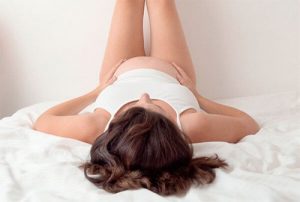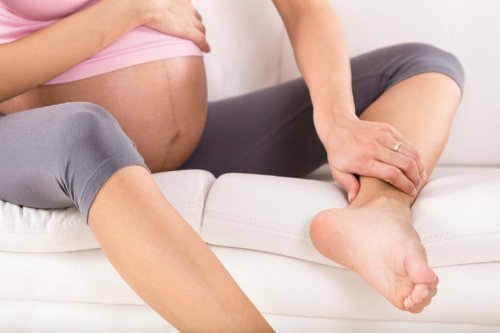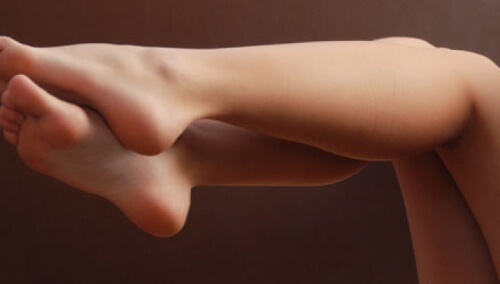Swelling During Pregnancy: Remedies and Tips to Reduce It

Swelling during pregnancy is a problem that many women suffer from. As your womb grows, your whole body transforms.
During pregnancy, swelling is a common problem, especially during the third trimester. Other normal issues that can bring down this happy time are back pain, acid reflux, constipation, and chronic exhaustion.
We’ll show you the main characteristics and remedies of swelling during pregnancy below, so you can be aware of the causes, symptoms and ways to alleviate it.
Swollen Legs During Pregnancy: The Most Common of All
One of the most common problems during pregnancy is swollen legs.
The majority of swelling during pregnancy is directly related to the pressure of your uterus, which is constantly growing, pushing on your pelvis and vena cava (the vein that carries blood from your lower extremities to your heart). As a result, blood fluid lessens and lymph builds up in your tissues.

Fluid retention in your legs, ankles, feet and toes make it harder for pregnant women to walk. The swelling and weight gain makes it more difficult to move.
Remedies and Tips for Swelling in Your Legs
Although you can’t completely prevent swelling in your legs, there are ways to reduce it.
We recommend putting your legs in cold water, and then quickly in warm water. Keep alternating them between temperatures for at least 5 minutes. The goal of this process is to stimulate blood vessels and reduce fluid retention.
To reduce edemas, pregnant women should follow a diet rich in diuretic fruits and vegetables. These include tomatoes, pumpkins, oranges, and asparagus. It’s also recommended to drink teas like elderflower, dandelion or verbena, as well as other medicinal plants that are safe for the mother and baby.
OB/GYNs also recommend that pregnant women with swollen legs make some lifestyle changes:
- Drink lots of fluids.
- Avoid junk food.
- Eat enough salt.
- Wear loose clothing.
- Exercise regularly.
- Don’t stand or sit for too long; Change positions often.
- Lie on your back with your legs up.
- Get a manual lymph drainage.
- Avoid wearing high heels.
“Swelling is associated with the process of pregnancy itself and the physical changes that women go through. Most of the time, it’s a common symptom of pregnancy “
When Should I Worry About Swelling During Pregnancy?
You should pay attention to all of the problems and discomfort you experience during this time, whether it’s due to pregnancy or not. Sometimes, noticing a subtle symptom early on can prevent something serious from forming.
Gaining a lot of weight in a short amount of time, neck pain, tingling in your hands and inability to move your fingers may indicate a kidney problem. If you have swelling with these other problems, you should seek immediate medical attention.

Talk with your OB/GYN about the edemas you have and how to reduce them. They can also tell you when swelling could be a sign of another problem. Some of the other problems could be preeclampsia or blood clots.
It’s important to be alert to sudden changes your body may go through during pregnancy.
Tips to Lighten Swelling During Pregnancy
While pregnant, it’s common for your lips, nose, hands, breasts, ankles, or legs to swell. Additionally, women carrying more than one baby usually experience more swelling.
If you live in a hot area or conceived artificially, you’re likely to have more swelling.
Don’t ignore the signals your body sends you, but be sure to relax and enjoy your pregnancy to the fullest. As we mentioned before, swelling usually doesn’t cause problems and disappears after delivery.
All cited sources were thoroughly reviewed by our team to ensure their quality, reliability, currency, and validity. The bibliography of this article was considered reliable and of academic or scientific accuracy.
- Coban A, Sirin A. Effect of foot massage to decrease physiological lower leg oedema in late pregnancy: a randomized controlled trial in Turkey. Int J Nurs Pract. 2010 Oct;16(5):454-60.
- Davison JM. Edema in pregnancy. Kidney Int Suppl. 1997 Jun;59:S90-6.
- Duley L, Henderson-Smart D. Reduced salt intake compared to normal dietary salt, or high intake, in pregnancy. Cochrane Database Syst Rev. 2000;1999(2):CD001687.
- Jafari A, Naghshi S, Shahinfar H, Salehi SO, Kiany F, Askari M, Surkan PJ, Azadbakht L. Relationship between maternal caffeine and coffee intake and pregnancy loss: A grading of recommendations assessment, development, and evaluation-assessed, dose-response meta-analysis of observational studies. Front Nutr. 2022 Aug 9;9:886224. doi: 10.3389/fnut.2022.886224.
- Marques NR, Martinello C, Kramer GC, Costantine MM, Vadhera RB, Saade GR, Hankins GD, Pacheco LD. Passive leg raising during pregnancy. Am J Perinatol. 2015 Mar;32(4):393-8.
- Morimoto K, O’Rourke L. Third Trimester Lower Extremity Lymphorrhea. Case Rep Obstet Gynecol. 2021 Nov 28;2021:3594923.
- Morgan S, Koren G, Bozzo P. Is caffeine consumption safe during pregnancy? Can Fam Physician. 2013 Apr;59(4):361-2.
- Ochalek K, Pacyga K, Curyło M, Frydrych-Szymonik A, Szygula Z. Risk Factors Related to Lower Limb Edema, Compression, and Physical Activity During Pregnancy: A Retrospective Study. Lymphat Res Biol. 2017 Jun;15(2):166-171.
- Reynolds CM, Vickers MH, Harrison CJ, Segovia SA, Gray C. High fat and/or high salt intake during pregnancy alters maternal meta-inflammation and offspring growth and metabolic profiles. Physiol Rep. 2014 Aug 5;2(8):e12110.
- Saliba-Júnior OA, Rollo HA, Saliba O, Sobreira ML. Positive perception and efficacy of compression stockings for prevention of lower limb edema in pregnant women. J Vasc Bras. 2022 Jan 31;21:e20210101.
- Sutham K, Na-Nan S, Paiboonsithiwong S, Chaksuwat P, Tongsong T. Leg massage during pregnancy with unrecognized deep vein thrombosis could be life threatening: a case report. BMC Pregnancy Childbirth. 2020 Apr 22;20(1):237.
- Smyth RM, Aflaifel N, Bamigboye AA. Interventions for varicose veins and leg oedema in pregnancy. Cochrane Database Syst Rev. 2015 Oct 19;2015(10):CD001066.
- Zhang N, Zhang F, Chen S, Han F, Lin G, Zhai Y, He H, Zhang J, Ma G. Associations between hydration state and pregnancy complications, maternal-infant outcomes: protocol of a prospective observational cohort study. BMC Pregnancy Childbirth. 2020 Feb 7;20(1):82.
This text is provided for informational purposes only and does not replace consultation with a professional. If in doubt, consult your specialist.
